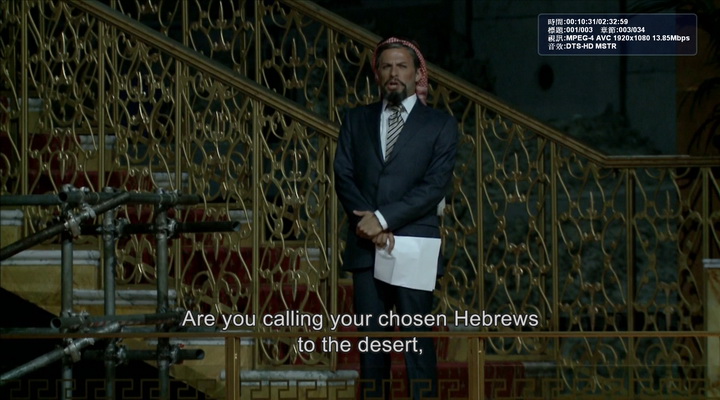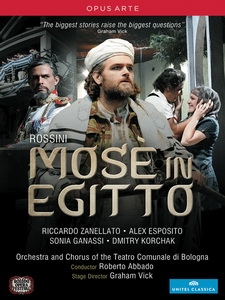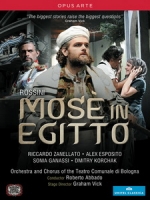商品分類
 |
產品編號 | B25V0464 |
| 影片名稱 | 羅西尼 - 摩西在埃及 (Rossini - Mose in Egitto) | |
| 影片選單 | 原版選單 | |
| 影片字幕 | 英 | |
| 碟片規格 | BD25 X 1 | |
| 備註 |
 |
 |
|
Rossini's Mosè in Egitto is no doubt a tough piece to deliver to a
modern audience. Repetition is the hallmark of its familiar story;
Andrea Leone Tottola, the librettist, didn't quite lick the problem of
bringing dramatic momentum to the recurring cycle of Moses's entreaties
and Pharaoh's vacillations. For the work's subplot, he summoned the
hoariest of opera seriaconventions: the Hebrew girl Elcia, in love with
the Egyptian prince Osiride, is torn between love and duty. You can
well understand why director Graham Vick, in this 2011 Rossini Opera
Festival production, would want to kick it up a notch. But his solution — turning Mosè into a parable about contemporary Mideast politics — is so invasive that it makes the work itself, with its bountiful musical invention, seem inconsequential. The action, as seen on the video, is as hard to unravel as the Iraqi civil war, but Mike Ashman's booklet notes tell us Moses is here Osama bin Laden (wearing a warrior's camouflage jacket under his priestly robes), the Hebrews are a band of terrorists, and Faraone and his wife, Amaltea, are the King and Queen of Jordan. The DVD box sports a blurb from Vick himself: "The biggest stories raise the biggest questions." But I wonder how many "questions" this work in fact raises. The opera's clearly ordered moral universe seems quite at odds with the director's relativism. Mosè ends, after the escape through the Red Sea, with an orchestral postlude depicting God's grace; here, the passage accompanies a young Palestinian boy as he straps himself up for a suicide bombing and approaches an Israeli soldier. Can Vick possibly even have heard Rossini's grand and noble music? Even allowing for the relevance of the director's conception, its execution is garbled in the extreme. Stuart Nunn's multilevel environmental set, constructed in Pesaro's Arena Adriatica (a converted basketball stadium), allows Vick to stage so many simultaneous fields of action that the video crew doesn't seem to know quite where to focus. (The production must have caused nightmares for Tiziano Mancini, the video director.) The Act I duet between the lovers provides a case in point. Vick situates them way off to the left side of the auditorium. (You can see the singers nervously glancing back at conductor Roberto Abbado.) Behind them, on the lowest level of the main playing area, guerrillas skulk around, crawling in and out of a minivan and strapping bombs together. It's difficult, if not impossible, to divine who these fighters are and what they might be up to. Even worse, they seem disconnected from the opera itself; it's as if a whole new show had engaged the director's attention while Mosè was being played out on the periphery. Nunn's jumbled set design makes it seem that the opera is unfolding during a closeout sale in a downscale furniture warehouse, and when Moses restores light to Egypt, a glitzy catering-hall chandelier rises to the ceiling. My guess is that this all meant to suggest a third-world simulacrum of first-world luxury, but it makes for two and a half hours of ugly images. Nunn's costumes are no easier on the eye: Sonia Ganassi, as Elcia, wears a dungaree dress that may well rank among the worst indignities ever visited upon a prima donna. On a musical level, too, the disc is frustrating. I suspect the culprit is the venue: the sprawling arena cannot have been a gratifying place to sing, and as recorded, the voices have little resonance. Ganassi, usually an impressive singer, here sounds discomfited; her voice seems parched and hollow. Dmitry Korchak, as her princely lover, is swift in coloratura, but the basic sound of his tenor is bleaty. The voice of bass Alex Esposito seems to have hardly any presence at all, especially in its lower reaches, but the huge hand he receives for his Act I scena indicates that it may have made more impact in the theater. Riccardo Zanellato, in the title role, fares better. His basso cantante registers more directly on a recent video release of his Zaccaria in Nabucco, but the present disc still lets us hear the voice's mellow warmth. With her bright, well-focused lyric soprano, Olga Senderskaya, as the Egyptian queen, Amaltea, is the principal least stymied by the recalcitrant acoustic. The Teatro Comunale Orchestra seems better situated than the singers to make a sonic impact. Under Abbado's sure-handed direction, some of Mosè's great moments come through, especially in a gorgeous Act II quartet, accompanied only by a harp. But this is not a disc that pays Rossini full honor. |
|
|
| Disc Size: 23,873,636,420 bytes Length: 2:32:59.203 Video: MPEG-4 AVC Video / 0 kbps / 1080i / 29.970 fps / 16:9 / High Profile 4.1 Audio: Italian / DTS-HD Master Audio / 5.1 / 48 kHz / 24-bit (DTS Core: 5.1 / 48 kHz / 1509 kbps / 24-bit) |
Powered by ShopEx v4.8.5 | ||||



